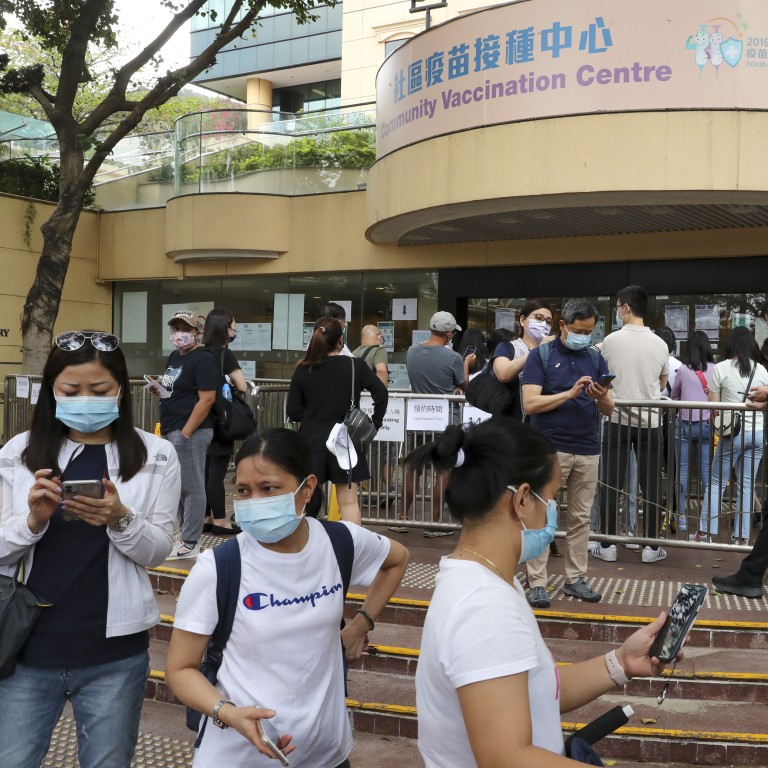
Coronavirus: Hong Kong ‘vaccination bubble’ plan not intended to coerce residents into getting jab, Carrie Lam says
- But the city leader acknowledges new incentives, many of which are tied to taking a Covid-19 shot, was crafted in the context of an ‘unsatisfactory’ inoculation rate
- The social-distancing changes have provoked a firestorm of criticism from the city’s restaurant and bar owners, many of whom insist the new rules are unworkable
Defending the multifaceted scheme rolled out a day earlier, Chief Executive Carrie Lam Cheng Yuet-ngor on Tuesday also insisted new rules for local restaurants and bars that some had already decried as unworkable were not overly burdensome.
“I don’t think it’s complicated,” she said. “The response I’ve got is very good.”
The rebuttal came as the city confirmed 13 new coronavirus cases on Tuesday, and announced the arrival of 300,000 more doses of the German-made BioNTech vaccine. Three of the new infections were locally transmitted – including one that was untraceable – while the rest were imported.
“This is our suggestion to the Singaporean government, which of course they have no objection to,” said Lam, who did not offer a timeline on when the talks would end and the bubble would launch, saying only: “I expect an early indication of agreement between the two sides”.
Hailing it as a “new direction in fighting the pandemic”, Lam on Monday unveiled a raft of changes to the city’s social-distancing measures, some of which were for the first time tied explicitly to Covid-19 vaccinations.
The plan will give vaccinated residents greater freedom to dine out in bigger groups, travel abroad and enjoy other relaxations of social-distancing rules.
Bars and pubs – closed entirely since late November – will be allowed to reopen at limited capacity, but only if all staff and customers have received their first vaccine dose. More restrictions will be lifted if both shots have been taken.
A staged relaxation was also announced for restaurants, which would permit diners to eat in groups of eight and extend dine-in services to 2am, if all restaurant employees were fully vaccinated and customers had received at least one dose.
But restaurant owners questioned if it was practical to require their employees to receive jabs, while others suggested the incentives were an attempt to coerce wary Hongkongers into vaccination.
Lam rejected that idea on Tuesday, saying the plan presented an opportunity for the city to get out from under the pandemic.
“Every country, every place has to design their incentives … taking into account the local context,” she told the press ahead of her weekly Executive Council meeting.
“The local context at this point in time is the vaccination rate is not very satisfactory. It’s about 8 per cent … [Now] we have a direction, timetable, road map to return to a relatively normal life, this is for everybody.”
Under the government’s plan, fully inoculated people will be allowed to visit care homes after passing rapid virus tests, while authorities are also looking to cut quarantine stays for fully vaccinated arrivals from lower-risk countries, possibly to fewer than seven days for some.
Earlier on Tuesday, Secretary for Food and Health Professor Sophia Chan Siu-chee told a radio programme the government would discuss with the restaurant sector how to implement the gradual relaxation in restrictions. One topic for discussion would be workaround measures for those unsuitable for vaccination to prevent outcomes such as workers being fired if they are unable to get inoculated.
“We do not want to see such a situation … We will discuss with the industry what kind of proof employees can provide that they cannot be vaccinated due to health reasons,” she said on Tuesday morning.
A day earlier, Lam had said the government was considering ending free Covid-19 screening services for those not subject to a mandatory testing order in favour of pushing residents to be vaccinated instead.
Britain ban lifted, but ‘chaos’ over special flights has some criticising coordination
Asked about those plans, Chan said it was only in the discussion stage, while noting mandatory testing remained important from the perspective of public health.
Chan also emphasised that vaccinations were more effective in protecting the public, and that people did not have to conduct tests as regularly once they had been inoculated.
“Of course testing is important in fighting the pandemic; it lets you know whether a person at that moment is infected. But testing does not provide protection,” she said.
Coronavirus pandemic is ‘a long way from over’, says WHO chief Tedros Adhanom Ghebreyesus
Ho Pak-leung, a microbiologist from the University of Hong Kong, said the government’s plan deserved public support.
Pointing out that “long-term pain is worse than short-term pain”, he told the same radio show he hoped the new measures could break the vicious cycle of outbreaks in the city.
But he also expressed disapproval of any move to dismantle the free testing system.
“If you are charging or making the arrangement inconvenient, fewer citizens will get tested and tests will be delayed. So when restrictions are relaxed, it could trigger a risk of more transmission chains in the community,” he said.
Addressing planned changes to Hong Kong entry requirements, Ho said authorities should first focus on low-risk countries, and only consider reducing the quarantine period for those coming from medium-risk destinations once they were confident in the local pandemic situation.
He recommended the city reached a local vaccination rate of 40 per cent before reducing the quarantine for medium-risk countries to 14 days.

